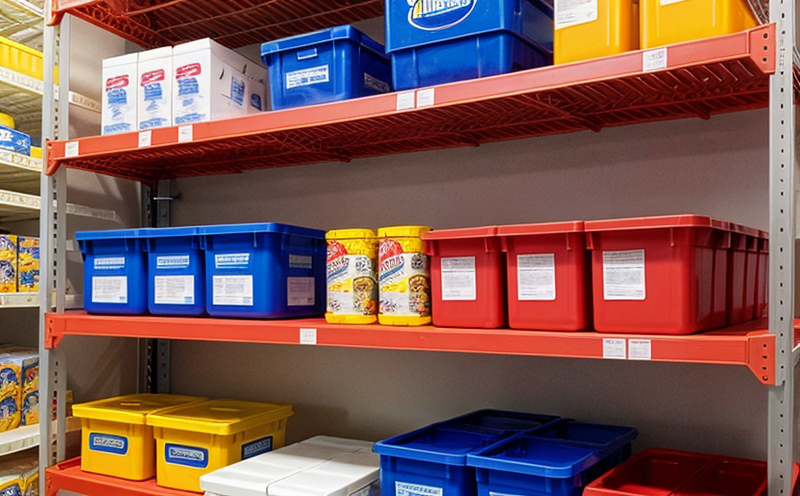ISO 27890 Microbial Shelf Life Profiling in Ready-to-Eat Meals
The shelf life of ready-to-eat meals is a critical aspect of food safety and quality management. Microbial growth can significantly impact the safety, acceptability, and shelf life of these products. ISO 27890 provides a standardized approach to microbial shelf-life profiling for such foods. This service ensures that our clients meet regulatory requirements while enhancing product safety and ensuring consistent quality.
The process involves several key steps: sample preparation, inoculation with microorganisms, incubation under controlled conditions, and microbiological analysis at various stages of storage. The aim is to determine the microbial growth patterns, spoilage thresholds, and potential contamination risks associated with specific ready-to-eat meals. This information is crucial for optimizing production processes, ensuring product safety, and extending shelf life.
Our facility adheres strictly to ISO 27890 standards, using advanced laboratory equipment to maintain the necessary temperature control, humidity levels, and other environmental conditions required for accurate results. The testing process typically spans multiple days or weeks, depending on the specific product and desired data points. This comprehensive approach ensures that we deliver reliable and actionable insights into shelf life.
One of the primary benefits of this service is its ability to help clients develop more effective storage and distribution strategies. By understanding how microorganisms behave under different conditions, companies can better manage their supply chain and reduce the risk of spoilage or contamination. Additionally, the data generated from these tests can be used to refine production processes, improving overall product quality.
The results of our testing are presented in detailed reports that include both quantitative and qualitative findings. These reports serve as valuable tools for decision-making, helping companies stay compliant with relevant standards while also enhancing their competitive edge in the marketplace.
Ready-to-eat meals present unique challenges due to their complex composition and frequent contact with various environmental factors during storage and consumption. Proper microbial shelf life profiling is essential for ensuring these products remain safe and palatable throughout their shelf life.
In summary, ISO 27890 microbial shelf-life profiling offers a robust framework for addressing the specific needs of ready-to-eat meals. By leveraging this standard, businesses can gain valuable insights into product performance, enhance operational efficiency, and maintain high standards of food safety.
| Sample Type | Microorganism Types | Inoculation Method | Incubation Conditions | Data Collection Points |
|---|---|---|---|---|
| Fresh and processed ready-to-eat meals. | Bacteria, yeast, mold. | Aseptic inoculation. | 4°C to 25°C. | Daily for up to two weeks. |
Benefits
The ISO 27890 microbial shelf-life profiling service offers numerous advantages to food and feed manufacturers. These include:
- Enhanced Food Safety: By identifying potential contamination risks early in the process, companies can take proactive measures to prevent foodborne illnesses.
- Predictive Shelf Life: Accurate predictions allow for better planning of distribution and storage strategies, reducing waste and improving customer satisfaction.
- Compliance Assurance: Ensuring adherence to international standards helps maintain a positive reputation and complies with regulatory requirements.
- Optimized Production Processes: Insights gained from the testing process can be used to refine manufacturing techniques and improve product quality.
In addition to these benefits, our service also provides detailed reports that serve as essential references for ongoing quality control efforts. These documents are invaluable resources for maintaining high standards of food safety and quality.
Industry Applications
| Application Area | Description |
|---|---|
| Ready-to-Eat Meals | Determining the shelf life of meals that are consumed without further preparation. |
| Packaged Foods | Evaluating the stability of packaged foods during storage and distribution. |
| Baby Food | Ensuring safety and quality in infant and toddler food products. |
| Pet Food | Analyzing the shelf life and safety of pet food products. |
| Meal Kits | Testing meal kits for microbiological stability during storage. |
| Snack Foods | Evaluating the microbial quality of snack foods over time. |
| Deli Meats | Assessing the shelf life and safety of deli meats. |
The above applications highlight how this service can be tailored to meet the specific needs of various sectors within the food industry. Each application area benefits from the detailed insights provided by our testing process, ensuring that products remain safe and high-quality throughout their shelf life.
Customer Impact and Satisfaction
The ISO 27890 microbial shelf-life profiling service has a profound impact on both customers and the broader industry. For clients, this means:
- Better Product Safety: By identifying potential hazards early in the process, companies can implement corrective measures to protect public health.
- Increased Customer Trust: Consistently high-quality products build trust and loyalty among consumers.
- Improved Operational Efficiency: Optimized production processes lead to reduced costs and increased profitability.
- Competitive Advantage: Superior product quality enhances a company's market position, making them more attractive to both retailers and end-users.
In terms of broader industry impact, adherence to international standards such as ISO 27890 promotes consistency across the food supply chain. This contributes to safer consumption practices and better resource management throughout the sector.





